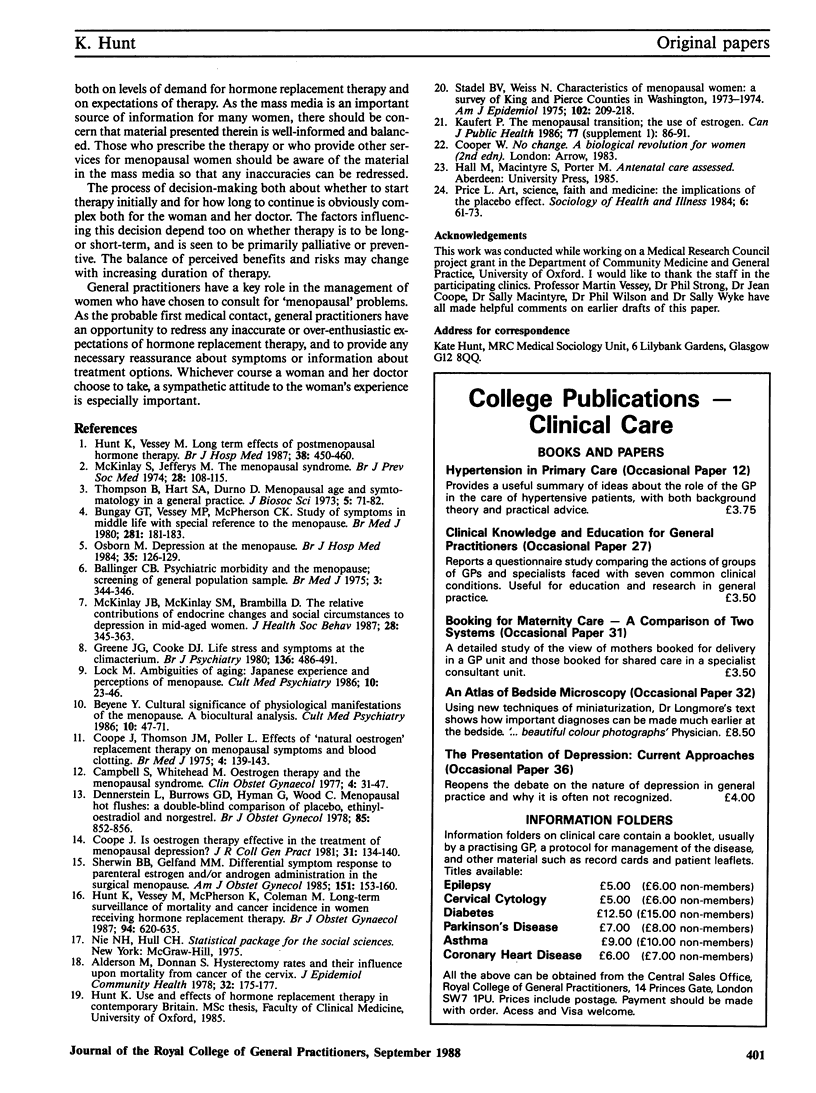Abstract
There have been many epidemiological studies on the effects of long-term use of hormone replacement therapy, but women's own views of this type of treatment have rarely been investigated. This paper presents data on experiences and perceptions of hormone replacement therapy from 3117 British women receiving the therapy who were attending a specialist menopause clinic, and in whom mortality and cancer incidence were being monitored. Almost 90% of the women claimed to have found the therapy helpful overall, although ascribed benefits for specific `menopausal' symptoms were often much more equivocal. Data are also presented on women's sources of information about treatment options. More women identified the mass media or a personal contact (48%) than a health professional (41%) as their first source of information, and over 20% indicated that they had exerted pressure on their general practitioner to obtain the therapy. These data point to the key role that general practitioners can play in managing `menopausal' symptoms once a woman has made the decision to consult.
Full text
PDF



Selected References
These references are in PubMed. This may not be the complete list of references from this article.
- Alderson M., Donnan S. Hysterectomy rates and their influence upon mortality from carcinoma of the cervix. J Epidemiol Community Health. 1978 Sep;32(3):175–177. doi: 10.1136/jech.32.3.175. [DOI] [PMC free article] [PubMed] [Google Scholar]
- Ballinger C. B. Psychiatric morbidity and the menopause; screening of general population sample. Br Med J. 1975 Aug 9;3(5979):344–346. doi: 10.1136/bmj.3.5979.344. [DOI] [PMC free article] [PubMed] [Google Scholar]
- Beyene Y. Cultural significance and physiological manifestations of menopause. A biocultural analysis. Cult Med Psychiatry. 1986 Mar;10(1):47–71. doi: 10.1007/BF00053262. [DOI] [PubMed] [Google Scholar]
- Bungay G. T., Vessey M. P., McPherson C. K. Study of symptoms in middle life with special reference to the menopause. Br Med J. 1980 Jul 19;281(6234):181–183. doi: 10.1136/bmj.281.6234.181. [DOI] [PMC free article] [PubMed] [Google Scholar]
- Campbell S., Whitehead M. Oestrogen therapy and the menopausal syndrome. Clin Obstet Gynaecol. 1977 Apr;4(1):31–47. [PubMed] [Google Scholar]
- Coope J. Is oestrogen therapy effective in the treatment of menopausal depression? J R Coll Gen Pract. 1981 Mar;31(224):134–140. [PMC free article] [PubMed] [Google Scholar]
- Coope J., Thomson J. M., Poller L. Effects of "natural oestrogen" replacement therapy on menopausal symptoms and blood clotting. Br Med J. 1975 Oct 18;4(5989):139–143. doi: 10.1136/bmj.4.5989.139. [DOI] [PMC free article] [PubMed] [Google Scholar]
- Dennerstein L., Burrows G. D., Hyman G., Wood C. Menopausal hot flushes: a double blind comparison of placebo, ethinyl oestradiol and norgestrel. Br J Obstet Gynaecol. 1978 Nov;85(11):852–856. doi: 10.1111/j.1471-0528.1978.tb15842.x. [DOI] [PubMed] [Google Scholar]
- Greene J. G., Cooke D. J. Life stress and symptoms at the climacterium. Br J Psychiatry. 1980 May;136:486–491. doi: 10.1192/bjp.136.5.486. [DOI] [PubMed] [Google Scholar]
- Hunt K., Vessey M. Long-term effects of postmenopausal hormone therapy. Br J Hosp Med. 1987 Nov;38(5):450-3, 456-60. [PubMed] [Google Scholar]
- Hunt K., Vessey M., McPherson K., Coleman M. Long-term surveillance of mortality and cancer incidence in women receiving hormone replacement therapy. Br J Obstet Gynaecol. 1987 Jul;94(7):620–635. doi: 10.1111/j.1471-0528.1987.tb03166.x. [DOI] [PubMed] [Google Scholar]
- Kaufert P. L. The menopausal transition; the use of estrogen. Can J Public Health. 1986 May-Jun;77 (Suppl 1):86–91. [PubMed] [Google Scholar]
- Lock M. Ambiguities of aging: Japanese experience and perceptions of menopause. Cult Med Psychiatry. 1986 Mar;10(1):23–46. doi: 10.1007/BF00053261. [DOI] [PubMed] [Google Scholar]
- McKinlay J. B., McKinlay S. M., Brambilla D. The relative contributions of endocrine changes and social circumstances to depression in mid-aged women. J Health Soc Behav. 1987 Dec;28(4):345–363. [PubMed] [Google Scholar]
- McKinlay S. M., Jefferys M. The menopausal syndrome. Br J Prev Soc Med. 1974 May;28(2):108–115. doi: 10.1136/jech.28.2.108. [DOI] [PMC free article] [PubMed] [Google Scholar]
- Osborn M. Depression at the menopause. Br J Hosp Med. 1984 Sep;32(3):126, 128-9. [PubMed] [Google Scholar]
- Sherwin B. B., Gelfand M. M. Differential symptom response to parenteral estrogen and/or androgen administration in the surgical menopause. Am J Obstet Gynecol. 1985 Jan 15;151(2):153–160. doi: 10.1016/0002-9378(85)90001-8. [DOI] [PubMed] [Google Scholar]
- Stadel B. V., Weiss N. Characteristics of menopausal women: a survey of King and Pierce counties in Washington, 1973-2974. Am J Epidemiol. 1975 Sep;102(3):209–216. doi: 10.1093/oxfordjournals.aje.a112149. [DOI] [PubMed] [Google Scholar]
- Thompson B., Hart S. A., Durno D. Menopausal age and symptomatology in a general practice. J Biosoc Sci. 1973 Jan;5(1):71–82. doi: 10.1017/s0021932000008956. [DOI] [PubMed] [Google Scholar]



